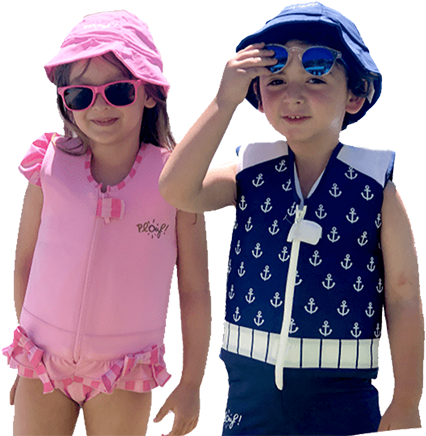No products in the cart
floating swimsuit for Children
floating swimsuit is designed with our unique FibreAir technology. Comfortable and safe, discover our drowning prevention and learn-to-swim swimsuits!

With the warm weather comes the sun, its heat and its dangers! Beware of dehydration!
Dehydration is a common condition in children, especially during the summer months or when they are ill. It occurs when the body loses more fluids than it takes in, and can lead to serious complications if not treated promptly. It is all the more risky when a child is exposed to it. Don't forget to give your child water to drink, and to protect his or her head from the sun with an anti-UV bobsleigh or a bathing cap !
It is therefore important to know how to recognize the signs of dehydration in children and how to act accordingly. Here are the main signs of dehydration to look out for in your little one:
Thirst is one of the first signs of dehydration. If your child complains of thirst or asks constantly for a drink, it may indicate that he or she is losing more fluid than he or she is taking in. So be sure to watch for symptoms!
Dry mouth is also a sign of dehydration in children. If your child's tongue and mouth are dry, it may be a sign that his or her body needs to be hydrated.
If your child is urinating less often than usual or if his or her urine is darker, it may indicate dehydration. Dark urine that is not very abundant is a sign that your child's body is retaining water to make up for the loss of fluids.
Fatigue and lethargy are also signs of dehydration in children. If your child complains of fatigue or falls asleep often, it may indicate that his or her body needs more fluids.
Dry, wrinkled skin is another sign of dehydration in children. If your little one's skin looks dry and wrinkled, it may indicate that he or she is losing too much fluid.
Sunken fontanelles are a sign of dehydration in very young infants and children. Fontanelles are the soft spaces between the bones of the skull, and when they are sunken, it can indicate the onset of dehydration.
It is important to treat dehydration in children promptly by providing clear, easily digested fluids such as water, oral rehydration solutions, clear broths or herbal teas. In severe cases, hospitalization may be necessary to provide intravenous fluids and electrolytes. If you suspect your child is dehydrated, it is important to seek medical attention immediately.
Dehydration in children is a potentially dangerous condition that can occur with diarrhea, vomiting, fever or simply loss of fluids due to excessive sweating. Here are the steps to follow if your little one becomes dehydrated:
Give fluids to replenish lost fluids. Drinking water is still the best, most obvious and easiest solution. Fruit juices, sodas and sugary drinks are not recommended as they can make dehydration worse because they contain little or no water.
If your child doesn't want to drink large amounts, try giving small amounts regularly. If necessary, use a syringe or spoon to give small amounts of fluid to your child.
If your child shows signs of severe dehydration, such as fever, persistent vomiting or severe diarrhea, it is important to seek medical attention immediately. In some cases, hospitalization may be necessary to adequately replenish your pooch's fluids.
Don't wait any longer, explore the collection Plouf on our website and get a discount on your first order with MONPANIER5 🎁 !
It's your turn! Tell us what you think in the comments!
Article Blog - Product Plouf

floating swimsuit is designed with our unique FibreAir technology. Comfortable and safe, discover our drowning prevention and learn-to-swim swimsuits!
Copy this code & use it in your shopping cart